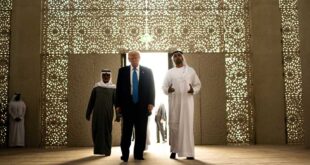Syria is very much in the headlines these days. Not only because it is the only Arab country being actively targeted by Israel, at a time when Gulf states are normalising relations with Tel Aviv, but also because of the way Arab and Gulf states have started making pilgrimages to its capital Damascus. The queue of supplicants at its gate, requesting the restoration of relations to their pre-’revolution’ norm, can be expected to lengthen.
On Thursday, the UAE announced the reopening of its embassy in the Syrian capital. At the same time, a Syrian airliner arrived in Tunisia’s Monastir airport bringing 150 tourists to spend the New Year holiday at its resorts. This was most definitely an act of ‘political tourism’ to a country that exported 5,000 Salafi fighters to join the extremist groups in Syria that sought to overthrow the regime with US and Gulf backing.
This political and diplomatic pilgrimage to Damascus is expected to intensify with the start of the new year. We can expect to see a procession of presidential and royal jets arriving in the Syrian capital bearing Arab heads of state seeking the goodwill of Syria’s leadership. Sudanese President Omar Hassan al-Bashir was the first to make the trip and warmly embrace President Bashar al-Asad on the airport tarmac, but we can be sure he will not be the last
Most Arab leaders have come to terms with the fact that Asad is remaining in power and that the armed opposition which spent seven years trying to topple him with American, European, Turkish and Gulf backing, is all but finished. US President Donald Trump’s announcement last week that he was pulling all remaining US troops out of Syria was an acknowledgement of that fact, and throws the doors open to an Arab return to the country.
It remains to be seen whether this normalisation with Syria will come at the expense of these same Arab regimes’ growing normalisation with the Israeli occupation state, or will be used to try to justify it. Some of the countries now trying to reopen their embassies in Damascus went a long way down the road of normalisation, hosting Israeli ministers and sports team. Syria is one of the few Arab states that has always opposed, and continues to oppose, any kind of normalisation with the occupation state, and has never received a single Israeli official on its soil.
Admittedly, some Gulf states, such as the Sultanate of Oman, never closed down their embassies in Damascus. Its foreign minster, Yousef Bin-Alawi, visited the Syrian capital a few months ago. Reliable sources also inform us that Bahrain intends to reopen its embassy in Damascus next week. The country’s foreign minister, Sheikh Khaled Bin-Khalifa, warmly embraced his Syrian counterpart when they ran into each other at a conference in September. In other words, this Gulf rapprochement with Syria began some time ago. But the UAE’s reopening of its embassy in Damascus is particularly significant given Abu Dhabi’s close relationship with Riyadh. The UAE can be expected to become an indirect channel of communication between the two capitals. In short, the Arab regimes are making a remorseful return to Damascus, because its army defeated the conspiracy, and its leadership stood fast and did not back down despite the massive scale of the plan to overthrow it.
Syria now belongs to a stronger alliance, the so-called Resistance Axis. It has a powerful strike-force, and an arsenal of advanced weapons that managed for the first time ever to serve as a deterrent against the Israeli occupation. And it has superpower backing from Russia, which expended blood and treasure on defeating American high-handedness in the Middle East. This axis now has the upper hand in the region, after America’s ignominious retreat and its ignoble abandonment of its allies, be they Arabs or Kurds.
 Geostrategic Media Political Commentary, Analysis, Security, Defense
Geostrategic Media Political Commentary, Analysis, Security, Defense





